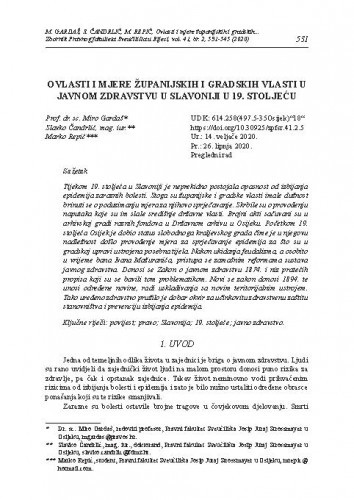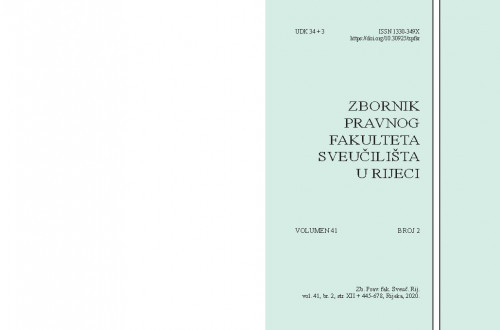Tijekom 19. stoljeća u Slavoniji je neprekidno postojala opasnost od izbijanja epidemija zaraznih bolesti. Stoga su županijske i gradske vlasti imale dužnost brinuti se o poduzimanju mjera za njihovo sprječavanje. Skrbile su o provođenju naputaka koje su im slale središnje državne vlasti. Brojni akti sačuvani su u arhivskoj građi raznih fondova u Državnom arhivu u Osijeku. Početkom 19. stoljeća Osijek je dobio status slobodnoga kraljevskog grada čime je u njegovu nadležnost došlo provođenje mjera za sprječavanje epidemija za što su u gradskoj upravi ustrojena posebna tijela. Nakon ukidanja feudalizma, a osobito u vrijeme bana Ivana Mažuranića, pristupa se zamašnim reformama sustava javnog zdravstva. Donosi se Zakon o javnom zdravstvu 1874. i niz pratećih propisa koji su se bavili tom problematikom. Novi se zakon donosi 1894. te unosi određene novine, radi usklađivanja sa novim teritorijalnim ustrojem. Tako uređeno zdravstvo pružilo je dobar okvir za učinkovitu zdravstvenu zaštitu stanovništva i prevenciju izbijanja epidemija.; During the 19th century, there was a constant risk of outbreaks of infectious diseases in Slavonia. Therefore, the counties and city authorities had a duty to take care to prevent them. In implementing these measures, they took care of the implementation of the instructions sent to them by the central state authorities, many of which are preserved in the archives of the various funds kept in the State Archives in Osijek. At the beginning of the 19th century, Osijek was granted the status of a free royal city, and it was within its competence to implement measures to prevent epidemics, for which unique bodies were set up in the city administration. After the abolition of feudalism, and especially during the time of Ban Ivan Mažuranić, began significant reforms of the public health system. The Public Health Act of 1874 was adopted, and several accompanying regulations were addressing this issue. A new law was enacted in 1894, which introduced certain newspapers, mostly to bring it into line with the new territorial organization. Regulated health care provided a useful framework for adequate public health protection and epidemic prevention.; Im 19. Jahrhundert stand Slawonien ständig in Gefahr vor Ausbruch von Infektionskrankheiten. Sowohl Gespanschafts- als auch Stadtgremien waren verpflichtet entsprechende Präventionsmaßnahmen zu treffen. Dabei mussten diese Gremien in Einklang mit Leitsätzen der zentralen Staatsgewalt handeln, von denen viele im Staatsarchiv Osijeks aufbewahrt wurden. Anfang des 19. Jahrhunderts wurde Osijek der Status einer freien königlichen Stadt erteilt. Als Folge dessen, hatte die Stadt auch Zuständigkeit über Durchführung von Maßnahmen zur Epidemieprävention und zu dem Zweck wurden Sondergremien in der Stadtverwaltung aufgebaut. Nach dem Ende des Feudalismus, und insbesondere zur Zeit des Feldherrn und Bans Ivan Mažuranić, wurden tiefgreifende Reformen des öffentlichen Gesundheitswesens ergriffen. Das Gesetz über öffentliches Gesundheitswesen und verwandte Vorschriften wurden 1874 verabschiedet. Ein neues Gesetz, welches gewisse Neuigkeiten umfasste, wurde 1894 wegen Anpassung an den neuen territorialen Aufbau verabschiedet. Ein solches Gesundheitswesen stellte einen soliden Rahmen für wirkungsvollen Gesundheitsschutz der Bevölkerung und Prävention von Epidemien.; Durante il XIX secolo in Slavonia si visse continuamente in una situazione di pericolo che scoppiasse un’epidemia di malattie infettive. Pertanto le autorità delle contee e delle città ebbero l’obbligo di premurarsi di intraprendere misure per prevenirle. Nell’esecuzione di queste misure ponevano in atto le istruzioni che arrivavano dalle autorità statali centrali. Numerosi esempi di tali istruzioni sono rimasti conservati negli archivi storici di diversi fondi custoditi nell'Archivio statale di Osijek. Osijek all'inizio del XIX secolo ottenne lo status di città reale libera e tra le sue competenze venne inserito anche intraprendimento di misure per la prevenzione dell’epidemia per la quale sono stati istruiti organi speciali nell’amministrazione cittadina. Dopo l'abolizione del feudalismo, particolarmente nell'epoca del bano Ivan Mažuranić, si intrapresero vaste riforme del sistema della sanità pubblica. Si adottò la Legge sulla sanità pubblica nel 1874 ed una serie di regolamenti allegati, che trattavano questa problematica. La nuova legge che introdusse alcune novità si adottò nel 1894, soprattutto per armonizzarla con la nuova organizzazione territoriale. La sanità regolata in questo modo offrì un buon quadro normativo per una protezione sanitaria efficace e per la prevenzione dello scoppio dell’epidemia.
Sažetak

 Zbornik Pravnog fakulteta Sveučilišta u Rijeci : 41,2(2020) / glavni urednik Željko Bartulović.
Zbornik Pravnog fakulteta Sveučilišta u Rijeci : 41,2(2020) / glavni urednik Željko Bartulović.